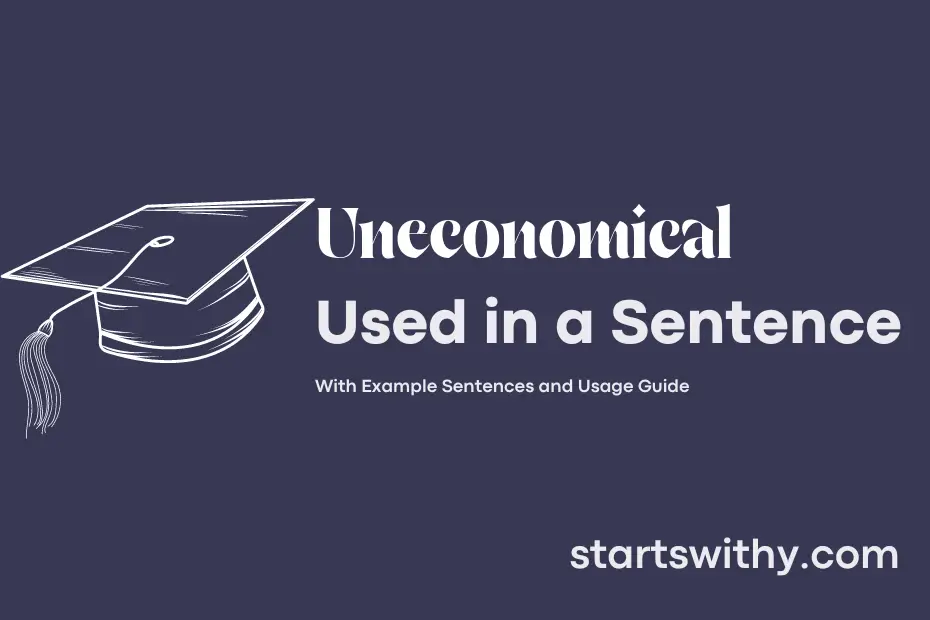Have you ever wondered what it means for something to be deemed “uneconomical”? In simple terms, uneconomical refers to a scenario or action that is not cost-effective or efficient in terms of resources or money.
When a product, service, or decision is deemed uneconomical, it often points to a situation where the costs involved in carrying out a particular task or operation outweigh the benefits or potential gains that could be achieved. This term is frequently used in various industries to assess the viability of different options and to avoid unnecessary financial losses.
7 Examples Of Uneconomical Used In a Sentence For Kids
- Uneconomical means not saving money.
- Buying too many toys is uneconomical.
- It is uneconomical to waste food.
- Turning on all the lights in the house is uneconomical.
- Using too much water is uneconomical.
- Leaving the TV on all day is uneconomical.
- Uneconomical means not using things wisely.
14 Sentences with Uneconomical Examples
- Uneconomical to buy a brand new textbook when you can borrow it from the library for free.
- Eating out every day is often uneconomical compared to preparing meals at home.
- It’s way more uneconomical to print out all your study material instead of going digital.
- Joining multiple expensive coaching classes can be a highly uneconomical choice.
- Buying a new laptop every year is extremely uneconomical when your current one works perfectly fine.
- Taking cabs everywhere can be quite uneconomical compared to using public transportation or walking.
- Purchasing stationery from the college bookstore can be uneconomical when you can get the same items at a lower price elsewhere.
- Choosing to live in a luxury apartment instead of a shared accommodation can be financially uneconomical for a college student.
- Spending money on expensive branded clothes can be seen as uneconomical when there are more affordable options available.
- It’s much more uneconomical to buy a printer for occasional use rather than utilizing the printing services on campus.
- Opting for a high-cost gym membership when there are budget-friendly options available can be considered uneconomical.
- Traveling long distances for a short event can be quite uneconomical unless there is no alternative available.
- Investing in the latest gadgets every semester is often uneconomical and can lead to unnecessary financial strain.
- Eating at upscale restaurants every day may be enjoyable, but it is undoubtedly uneconomical for a college student on a tight budget.
How To Use Uneconomical in Sentences?
To Uneconomical means something is not cost-effective or not efficient. Here is a simple guide on how to use this word in a sentence:
-
Adjective Placement: Uneconomical is an adjective that typically comes before a noun to describe it. For example, “The old car was uneconomical to repair.”
-
Comparison: You can use uneconomical to compare two or more things in terms of efficiency or cost-effectiveness. For instance, “Using a private taxi every day is uneconomical compared to taking public transportation.”
-
Negative Connotation: Uneconomical usually has a negative connotation, implying that the inefficient use of resources or money may lead to wastefulness. For example, “Leaving the lights on all night is uneconomical and bad for the environment.”
-
Context: Make sure to consider the context in which you are using uneconomical to ensure that it accurately conveys the meaning you intend. It is important to use this word in appropriate situations where inefficiency or wastefulness is being discussed.
Remember, using uneconomical in a sentence can help you express the idea of not being cost-effective or efficient. Practice using this word in various contexts to become more familiar with its usage and nuances.
Conclusion
In conclusion, using uneconomical sentences in writing can be detrimental as they lead to inefficiency and wastage of resources. Such sentences are often verbose, redundant, or obscure, failing to convey information effectively. They can confuse readers, diminish the overall quality of the text, and disrupt the flow of communication. To enhance clarity and coherence in writing, it is crucial to avoid uneconomical sentences and strive for conciseness and precision.
Efficient writing is essential in delivering a message clearly and effectively. By eliminating uneconomical sentences and opting for concise and straightforward language, writers can create more compelling and impactful content. Embracing brevity and focus in sentence structure enhances the readability, coherence, and overall quality of the written work.



